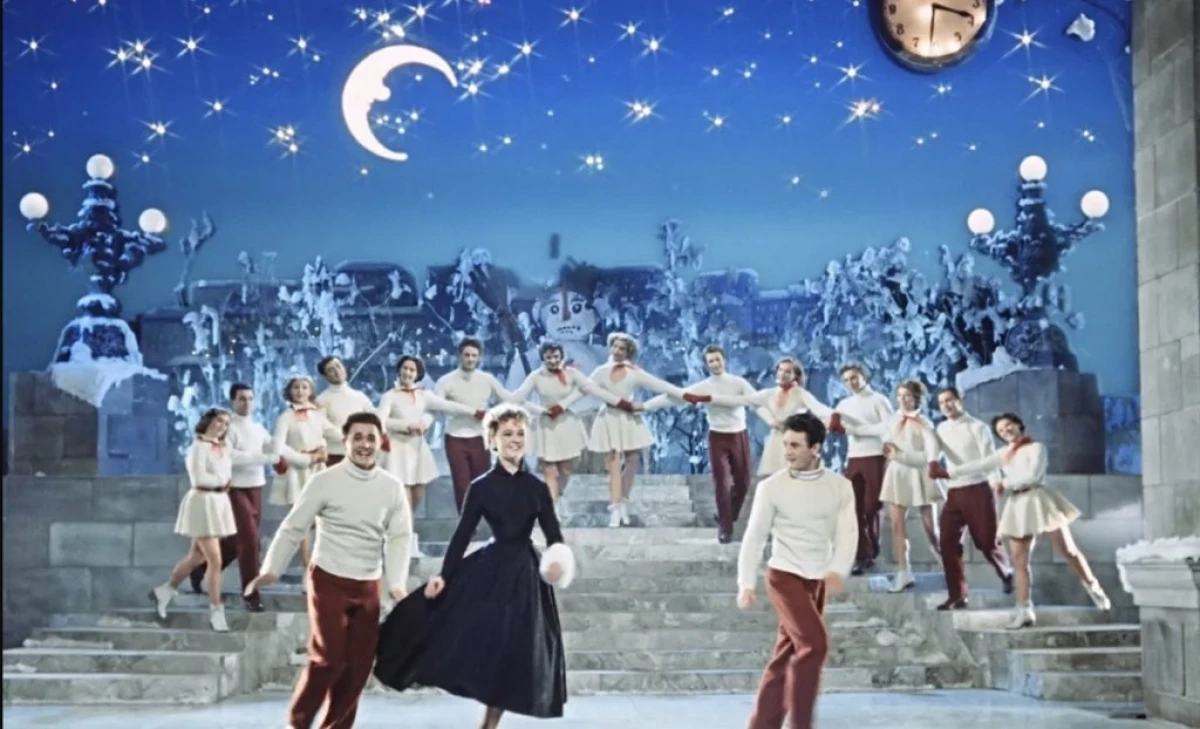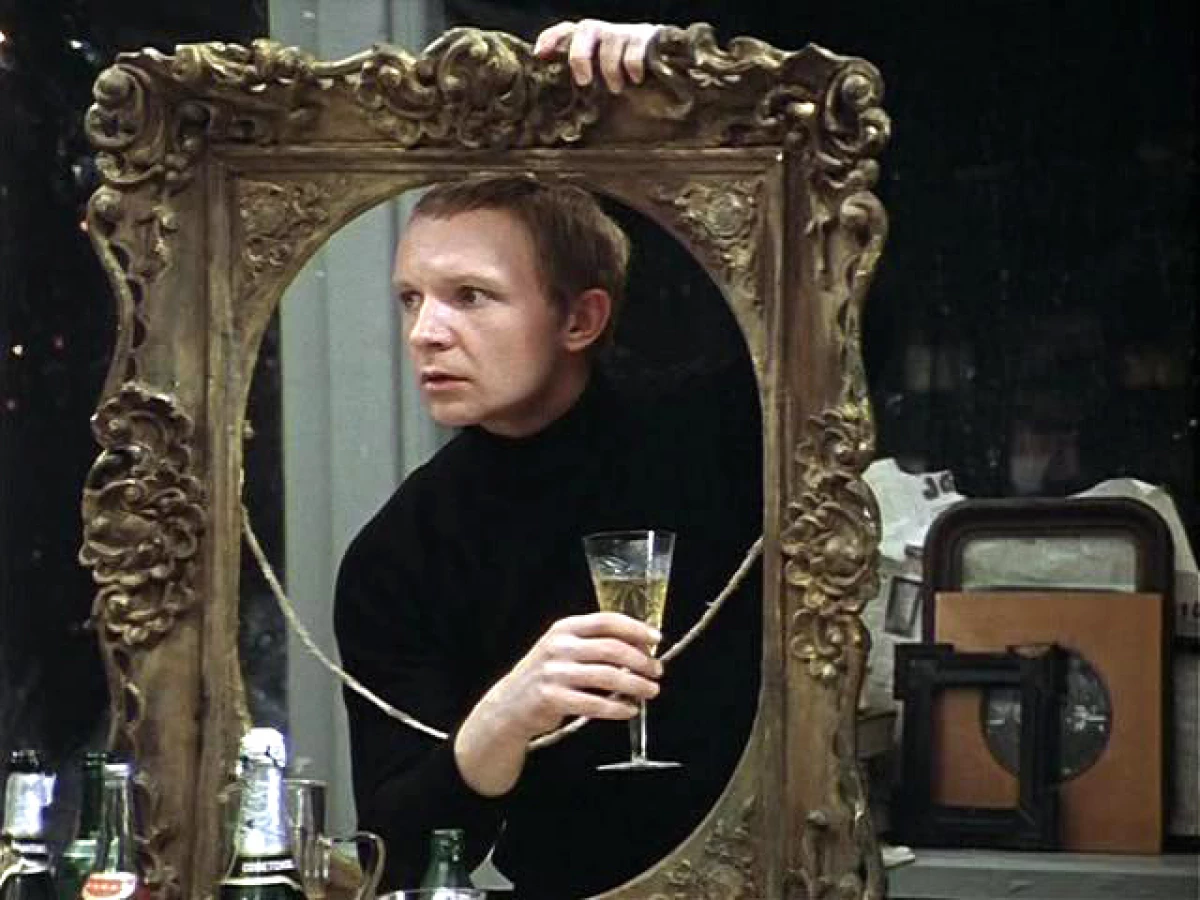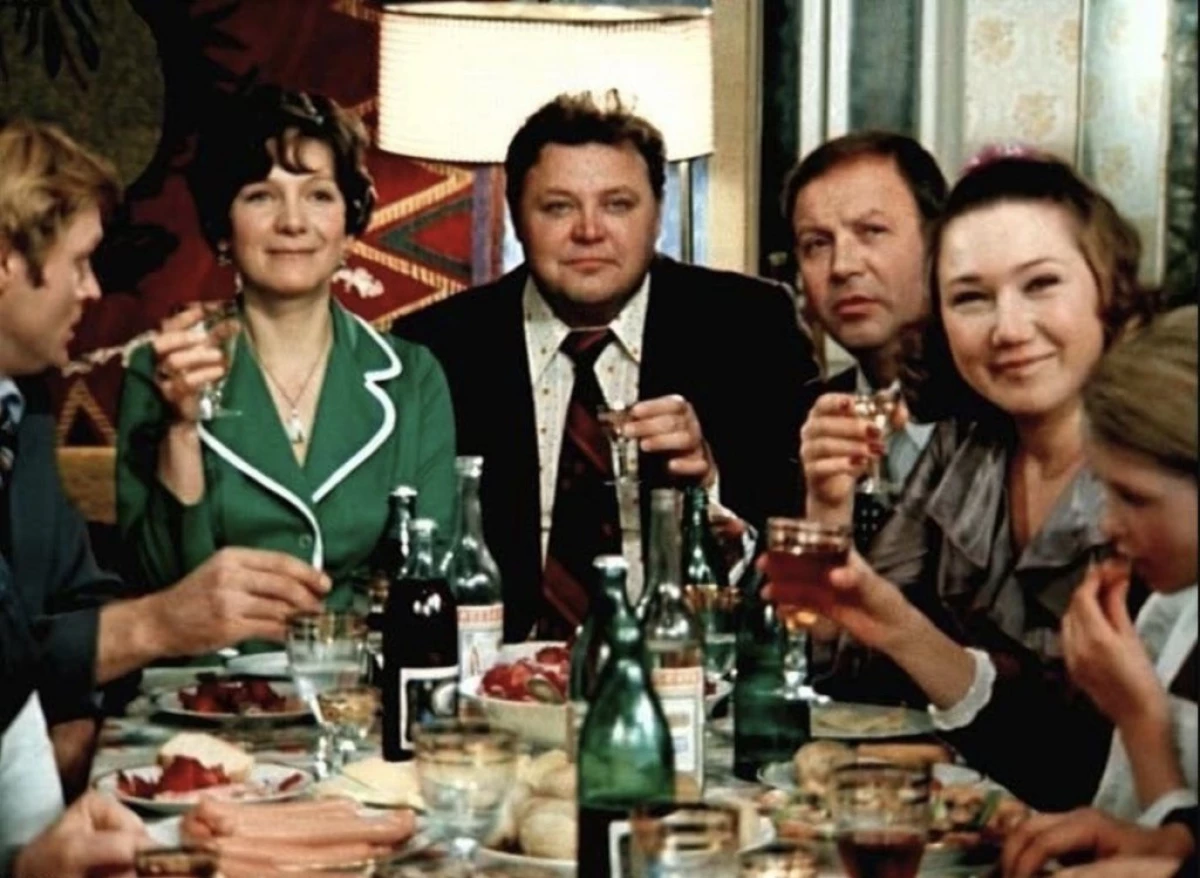
New Year's cocktail. Recipe. Miracle, novelty, time
The new year contains the traditions of updates, the experiences of the miracle and stop the time. All this together, taking advantage of the word Comrade Ogurtsova (Igor Ilinsky) from the "carnival night" (1956), "Nonypical" for Soviet daily. Household, bureaucratic Volokita, acute experience of loneliness - these circumstances accompanied the Soviet person regularly. However, under the New Year was rapidly disappeared. In any case, on the screen.
The disappearance was not always painless: People's Element needs curb, chaos is doomed to enter their shores, and unrestrained writing on New Year's Eve turns around a heavy hangover in the morning. Even in this, a fairly landed description of the Soviet (and post-Soviet) New Year's ritual reflects the structure of the carnival in the interpretation of the philologist and the culturologist Mikhail Bakhtina. The time when everything changes in places, the world stands up on the head, and the bureaucratic order and the "essentialness" (another word from Lexicon Ogurtsov) are replaced by a democratic chaos and dancing similar to Hollywood.
It was on this that the "carnival night" (1956) was built - the debut of Eldar Ryazanov in the game movie: the authorities of power in the face of Ogurtsova face up to full, speaking by the language of the 2020, zeroing: in the logic of the carnival Acting director only and can fly At the hall of the Palace of Culture in the box for focus. Carnival as a feast of freedom and sensuality does not endure false, the secondaryness of Ogurtsov, his depressed physicity (no coincidentally, the cucumbers closely focus on the legs, which should be "isolate", and the kissing clowns of the same sex produce a "bad impression"). The only way out is universal and limitless laughter, laughter, takes away from the bureaucrat his social privileges.
The hero of Igor Ilinsky is a traditional fool for Russian tales, but a Soviet person's reflied in the boiler. The fool turns out to be an initiative, an Assexual bureaucrat is emphasized - the dust of Stalinsky time, leaving, as it seemed to be thawed, in the past.
In the language of the Soviet myth, the cucumbers-fool is Antonym of the fabulous Ivanushka: an official, unlike his pre-preparation, is trying to block the energy of the carnival, the air of freedom and a miracle of reincarnation. While the heroes of different ages and social statuses - from the sparkling youth and mobility of the Lenochka Krylovy (Lyudmila Gurchenko) and Grisha (Yuri Belov) to the intelligent-power Fedor Petrovich (Andrei Tutyushkin) and Adelaides Kuzmichnaya (Olga Vlasov) - I will gladly break up with masked roles "Knithikov" of the Kazenno-bureaucratic world, the cucumbers remain a "man in the frame" (so called the cartoon of Fedor Khitruka 1962, similar on the problem), imposing restrictions on the element of a thirst for mercy, not agreed by the totalitarianism.
This is quite explained, because for Ogurtsov, parting with his mask is equivalent to losing himself, its meaning is to be a barrier on the path of cancellation of the world of instructions and iron festive canons of Stalin's time.
Already in the "carnival night" of Ryazanov outlines one of the central to themselves: the Soviet person exists in tough social and household borders, to break which can only be a miracle, cancel the existing hierarchy ... or the irony of fate.

If the thawed New Year's miracle resembles a freedom festival from social conventions imposed by a collectivist ideology, then the country's main festival film is "Irony of Fate, or with a Light Ferry!" (1975) - Thins the problem. Here, as in the "Carnival Night", there is a fool - Zhenya Lukashin (Andrey Soft), fighting for the heart of Princess Nadi (Barbara Brylsk), and his jealous of Ippolit (Yuri Yakovlev). Carnival for the mid-70s becomes a personal matter of individuals in typical apartments. And the main and authentic parties are famous Brezhnev, walking in the planet in the animation prologue of the picture.
In essence, under the mask of the Soviet New Year's fairy tale, with all the attributes of Ryazanov, it makes a diagnosis of an era: a Soviet man, so diligently to transform a giant space around, turned out to be enslaved by him, became the same typical in the sense of the needs and scale of miracles, like housing Nadi, frank and Millions of their non-screen fellow citizens.
And what a miracle can give rise to a modest apartment of ribbed shades, except for French spirits and a lover, hosting a shower in the fur hat? In this joining the ritual framework system, the miracle is randomly encountered (and how else?) Fate: only now it is deprived of the sparkling youth of the 50th or a stoic desire for a dream (this can be found in the "snowy fairy tale" of 1959 Alexei Sakharov and Eldar Schanglaya). Lukashin and Shevelev, everything is simple: a miracle is going on in the life of standard people, at the crossroads of a single organized space and the frozen time of New Year's night.
And in full compliance with the folk logic of Durak Lukashin, who crashes everything in its path (not only furniture, but also other people's relationship), is rewarded. It was to him, "an inappropriate person," the princess goes out, and not the "regulatory" hypolyte. Like Ivan-Fool, who accidentally falls on the groom's wool for the royal daughter, Lukashin spontaneously turns out to be in the imperial greatness of Leningrad, and therefore the bride is a teacher, and not princess.
But the path to the miracle in the Ryazan fairy tale is not easy to: without pre-New Year cleansing, the ablution - you will not attend love. Therefore, it is no coincidence that at the beginning of the film as if the mythological motive of the campaign in a bath occurs. In the Soviet bathroom, even with the Finnish plumbing, you will not disappear from the nasel of social conventions. Therefore, a demonstrative exit from the Longsovtsky Space of the Services (it is appropriate to remember Nuhin from "Cherryev", where VP (magic wand) acts only in the service sector, reflecting the carnival dream of domestic comfort) into the symbolic space of the bath - eloquery irony. Thirst compensate for a unsettled life - both material, and family - displaced the former carnival on the backyard of history, reduced the dream of a great conversion of peace to Hollywood happiness in his personal life.

Even more definitely, aggressive consumption and the deep symbolism of the New Year is comprehended in the film "Old New Year" (1980) Oleg Efremova and Nama Ardashnikov. The struggle of the old and the new looks here in Eisensteinovski visually and allegorically. The desire of the working class to have "everything like people", personified in the image of Peter Cebeykin (Vyacheslav Invisory), and the demonstrative refusal of the intelligent family of Peter Polmiom (Alexander Kalyagin) is equally ridiculous and tragic, and to bind these lost apostles in the late Socialism ( Well, it's not an Eisenstein on the soil of stagnation!) Can only Soviet first-travelers - Ivan Adamych (Evgeny Evstigneyev), who "feels with the people", without sharing the professional classes and income level.
Hero Evstigneeva - another version of the fool, now it is no longer a carnal-bureaucratic, like cucumbers, and not "mass" in the face of Lukashina, but tragic. A peculiar bitter mockery over the delegated man's ideal born of revolutionary elements and the avant-garde of the 20s. And at the same time, the ommage of Rabnestetsky humanism and the struggle for human dignity - the key, according to Nauma Kleiman, the topic of Eisenstein.
Now Adamyach is not taken seriously, and he himself hardly squeezes between the junction of cabinets, tables and festive dishes in attempts to get to the answer to the question: "And who is such a person?" But this, the Soviet dream, who worns, who worn by the wind is lost, is able to connect the heroes-masks in the ancient scenery of the bath, where the proletarian and the intellectual merge in ecstasy, freeing from the matriarchy in the family and obsessive attention to things. Only in the final stage, removed from the wrong seriousness of the theologian Sovietology, was found to be forgotten by Peters (read, renounced!) Essence of life. And understanding it, they reach the aristocratism of almost Roman patrician.
It is at the turn of the 70s and 80s that the carnival fairy tale ends. Ahead is the harsh reality of the late stagnation, schizophrenic chills of restructuring and the collapse of the country. Sniperski's loss of the Lowness illusions accurately fixes the "Carnival" (1981) Tatyana Lozinova. The world of the unrestrained holiday is reduced in the film to the imagination of Young Nina Solomatina (Irina Muravyov). The provincial girl who dreams of becoming an actress is the basic archetype of the Soviet cinema, but in Karnavale, the fantasy does not develop into reality. The heroine of Muravyova perceives the world through the screen: only in the cinema hall it is capable of deep and truthful emotions. Bente the limits - on it a cheerful clown girl's mask in the yellow take on the head and children's rollers on the legs. Lioznova creates a female version of Fool-Lukashin, only now instead of St. Petersburg aristocracy - Moscow Glamor and Nevtyba. And the fool-Solomatina is not rewarded for the chaos generated by it, and again comes to the city of childhood, to the quietly hated mother, - truly return of the prodigal daughter, replaced from the "plus" to the "minus" final "Solaris" Andrei Tarkovsky.
Pick up with myth!At this biblical note it would be possible to finish the story of the National Dreams of Soviet Dreams on the expanses of the New Year's film. But Yuri Mamin, who released the "Newune Holiday" in 1986, introduced his ring chord to this non-stroke score: not only the answer to the fabulous aspirations of the "Carnival Night", but also to massacre over the Soviet filmmife of the 30s.
The director creates a large-scale epic in an intentionally bored space. The small village of small heels every year successfully reports on January 1, Neptune's festival - sending to the ritual of dedication to the seafarers and to the carnival fun poning the leaders in the pioneer camps of the late USSR.
As the epic farce relies, reports are pure profanation, and the festival exists only in the imagination of local bureaucrats. But one day there is a need for a real holiday, because the New Year has been appointed a visit to high Swedish guests (the Shadow of Eisenstein is also here!) Interested in how things are in the Soviet Union with "Lorsery".
From this point on, the action is rapidly accelerating, and what is happening on the screen acquires the form of buffonads in the unassuming scenery of the Soviet province (the film was filmed in ancient Pskov and Izborsk), with a fair share of Soviet idiocracy. The new year in small heels turns around with an epic ritual parodyting the famous Scene of the Battle of Russian Bogatiy with Swedish knights to the music of Prokofiev from Alexander Nevsky, Eisenstein. Only now, under the same majestic chords of the composer, the Militian "Zhiguli" cut down the streets of small heels, accompanying "Ikarus" with overtrown guests, and Russian warns straight from the bath, not embarrassed by public nudity, jump into ice water.
Exposing (in the literal and figurative sense) of the epistemic of Eisenstein, Momin, thereby decorating the Soviet historical filmmife - this cast of stopping time, similar to his static experience of the New Year. Almost cardboard costumes remained from the heroic samples of the past, and instead of real icons - cheap reproductions, consumer imitation A La Russe for a foreigner. So the director with sadness states: even a grandee and talented myth is not able to withstand universal facade, stupidity and thirst to be saturated - a bizarre mixture of carnival rags and Russian humiliation.
It is symbolic that the debut of the Mine got a skip to a wide screen thanks to Ryazanov. The myth-macity gave way to parody. The circle closed. And the chimes are still beaten twelve.
The author thanks for the help of Kinovtedov Natalia Nusinov and Assu Novikov
